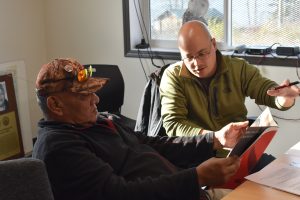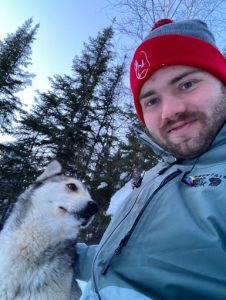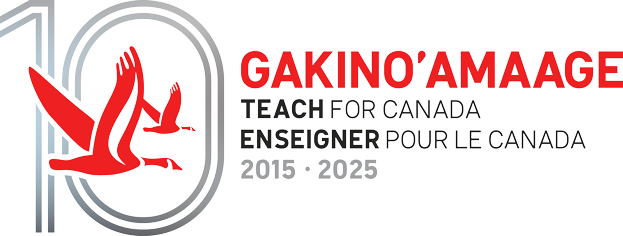About Teach For Canada’s Impact and Learning Team
Teach For Canada recognizes that First Nations have an inherent right to the ownership, control, access, and possession (OCAP®) of their information and should be active partners in every aspect of research taking place in their communities. Across Turtle Island, Indigenous communities have a history of colonial-imposed research practices, aimed at conducting research “on” rather than “with” First Nations. These methods typically fail to include Indigenous perspectives, ways of knowing, and culture in their approach.
The Impact and Learning department—an arm of Teach For Canada dedicated to upholding First Nations data sovereignty when determining the impact of our organization—was launched with this as a fundamental principle.
Research-Evaluation-Framework-Graphic_2022
How Impact and Learning Came to Be
Teach For Canada was founded in 2015, as the result of an Action Canada Fellowship. Around this time, Danbi Cho (former Director of Impact and Learning), met with Kyle Hill (co-founder and former Executive Director), to discuss the approach that many non-profits across Canada had been taking to determine, communicate, and showcase their impact.
They noted that while First Nations had indicated an interest in becoming more involved in research processes, many organizations had not been conducting this work in the spirit of respect and reciprocity. While First Nations were expressing an eagerness to slow down the rapid process of data collection and learn more about conducting research and evaluation themselves, many organizations had failed to center Indigenous perspectives, or recognize First Nations as leaders in research.

Danbi Cho, former Director of Impact and Learning, meeting with community partners in Pikangikum First Nation (2019).
Conducting Research in a Good Way
Since 2017, Teach For Canada’s Impact and Learning team has worked to develop a unique Research and Evaluation Framework in partnership with the First Nations we serve. The framework is the result of a multi-year learning journey. Throughout this time, Danbi traveled to First Nations to meet and spend time with community partners. Nearly two years were invested into extended visits in communities, where Danbi met with Chiefs, Elders, Council Members, and Education Authorities.
“When meeting with community partners, I’ve been learning that what’s different from our approach is that we’re actually taking the time to do this research in a good way. When I meet with Chief and Council and Education Authorities, I’m not just arriving and dropping a proposal on their desk. I am working with them to determine what needs to be included in this proposal and identify what values, cultural norms, and agreements need to be in place for us to do this work effectively.” – Danbi Cho, Former Director of Impact and Learning
Building upon the framework, First Nations are involved in every aspect of Research and Evaluation Projects, from determining educational goals that both the community and Teach For Canada are looking to advance, to developing research questions, selecting data collection methods, and finalizing a report that reflects our collective impact.
The outcome of these partnership-based research projects, including project results and proposed next steps, are beneficial to First Nations because they can be leveraged to influence policy, or provide insights and information to help close an identified education gap.
“It’s about a true partnership where the findings of our Research and Evaluation work benefit both parties.”
– Danbi Cho, Former Director of Impact and Learning
Community First Research and Evaluation Projects
Now directed by Deanna Matthews, the Impact and Learning team piloted two community research projects in 2021, with Kitchenuhmaykoosib Inninuwug in northern Ontario, and God’s Lake Narrows First Nation in northern Manitoba.
While travel restrictions have prevented Deanna from visiting with community partners in-person, the Impact and Learning team has been working to building meaningful relationships with First Nations community leadership. Taking the time to incorporate traditional Indigenous knowledge in every element of the proposal design and research processes ensures that the resulting research projects are conducted in close partnership with First Nations and respect a community first approach.
Through Teach For Canada’s 16-week Research Training Program, Deanna has supported program participants to develop research and evaluation skills, while simultaneously identifying community-specific education goals.
Dennis Keaveney was one of the community-based research leads who took part in a 2021 pilot project, with the goal of identifying ways to better incorporate Oji-Cree into the school’s curriculum.

Dennis Keaveney participated in Teach For Canada’s Community Research Training Program in 2021.
When asked what drew him to take part in the Program, Dennis mentioned a town hall meeting where he had listened to Indigenous language teachers talk about the pressure that they were receiving from administration to follow the provincial curriculum. The teachers were seeing serious problems with the way that language was being valued at the school and felt that they were being closed off from speaking their language and effectively doing their work.
“When I heard about this research opportunity, I was immediately thinking about how I could strengthen their concerns by using community input to put some real data behind them.”
– Dennis Keaveney, 2021 Research Training Program participant
The findings from these projects have brought community-specific education goals to light and will help demonstrate the collective impact of First Nations partnerships with Teach For Canada. The resulting data will ultimately feed into Teach For Canada’s evidence-based programming while supporting school improvement efforts and local advocacy.
In 2022, the Impact and Learning team continues to advocate for First Nations data sovereignty, and they are working hard to offer the online Research Training Program to even more community partners. Teach For Canada is grateful to be working with communities, and greatly values the input, feedback and guidance we receive from these partnerships.






